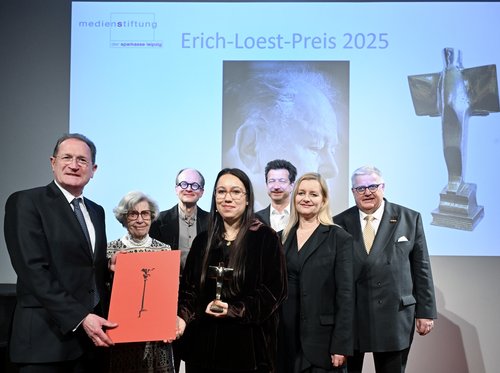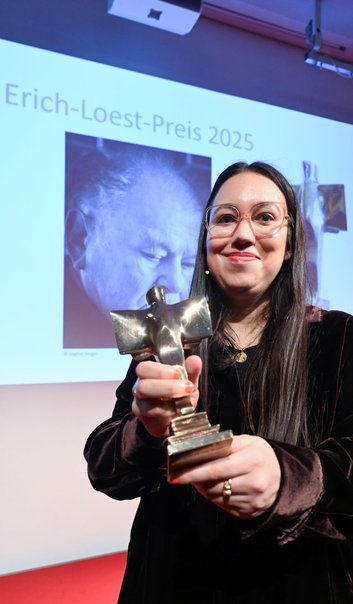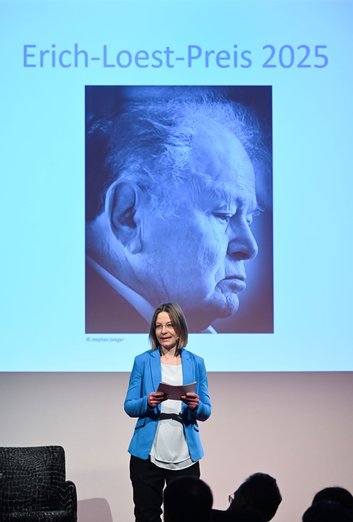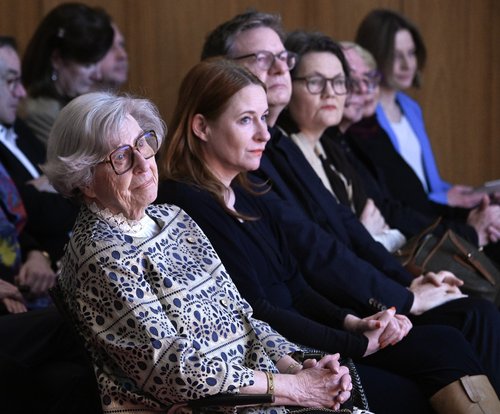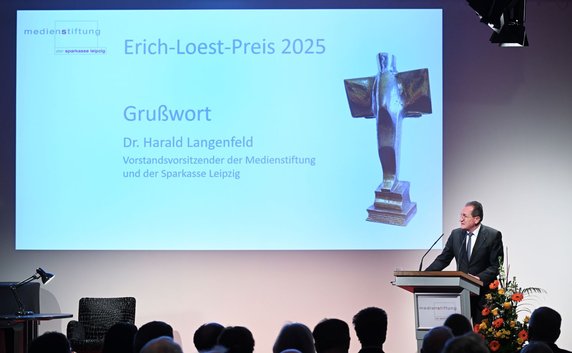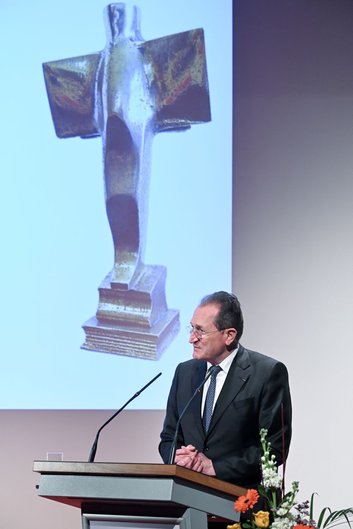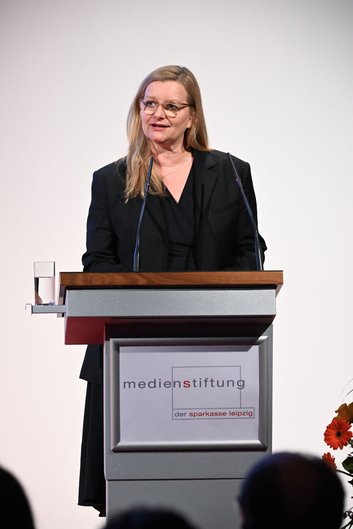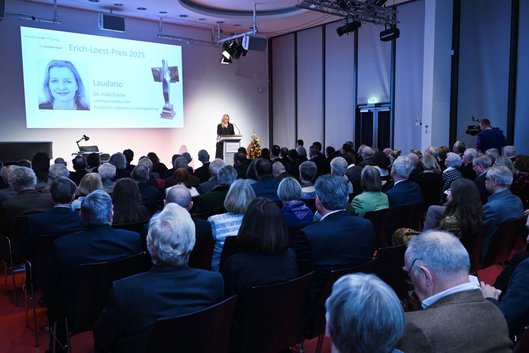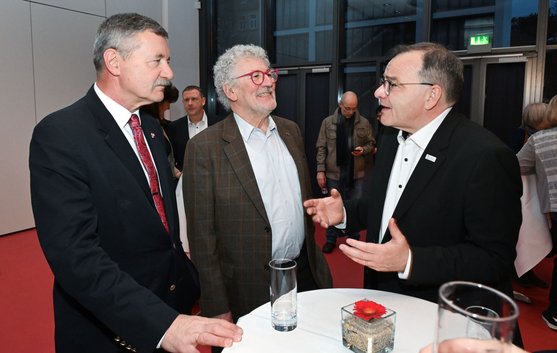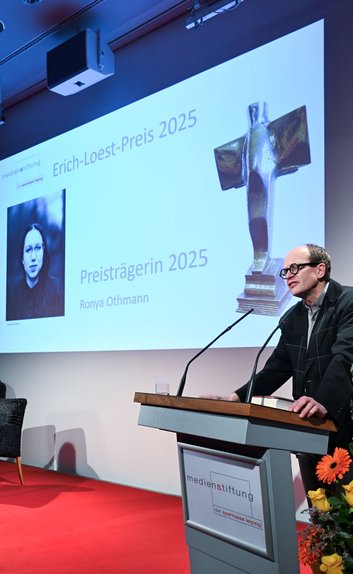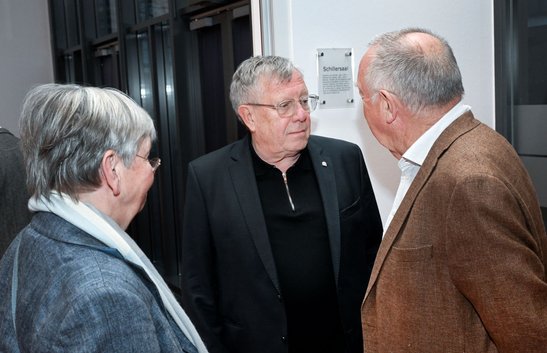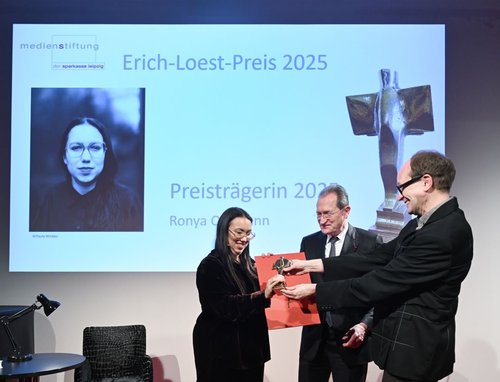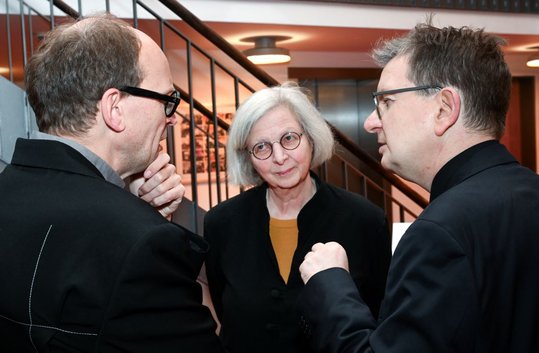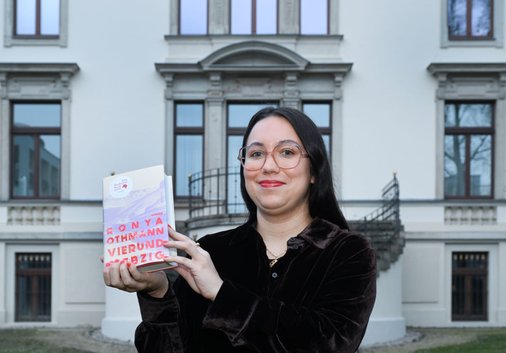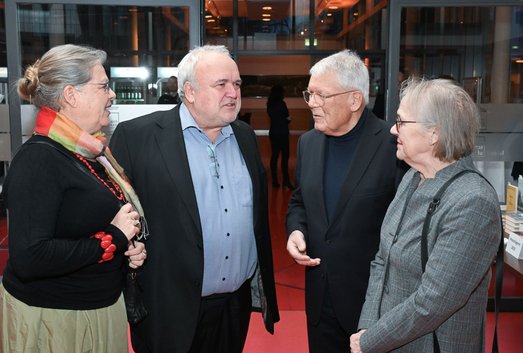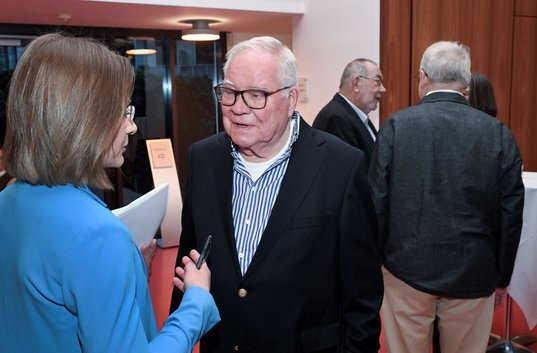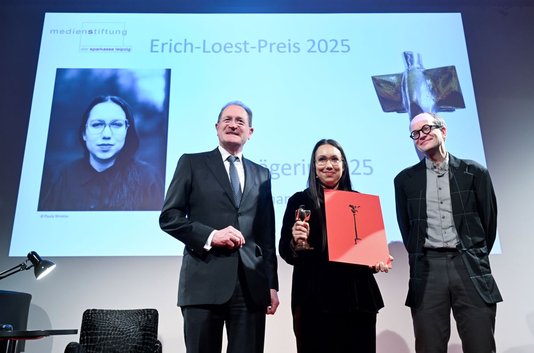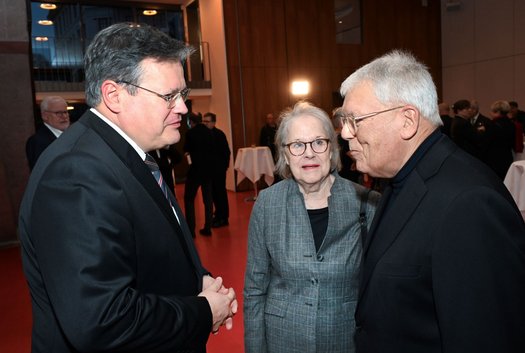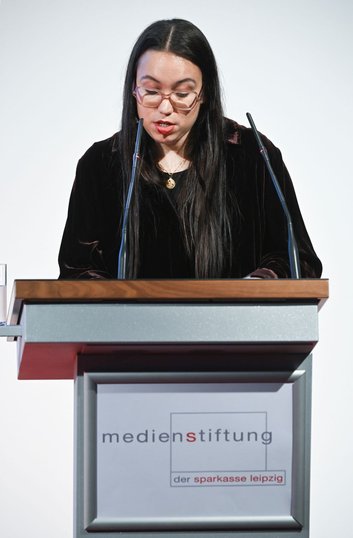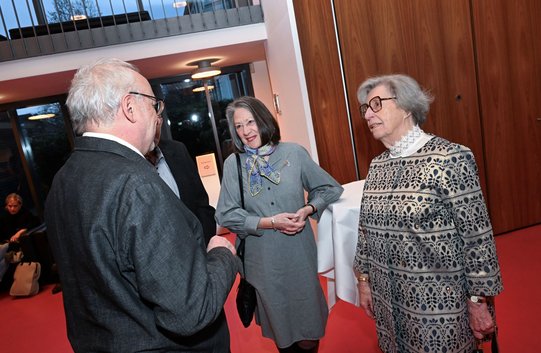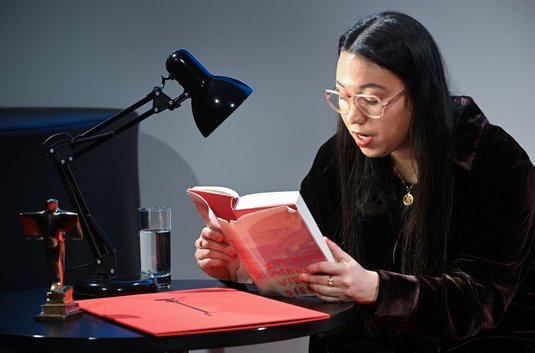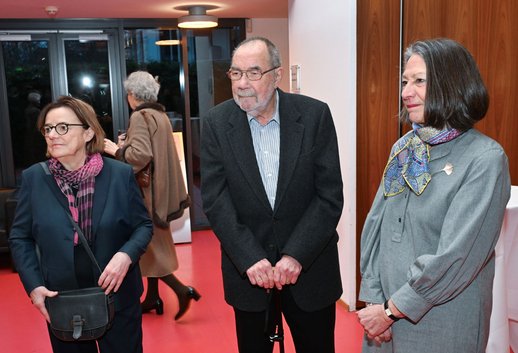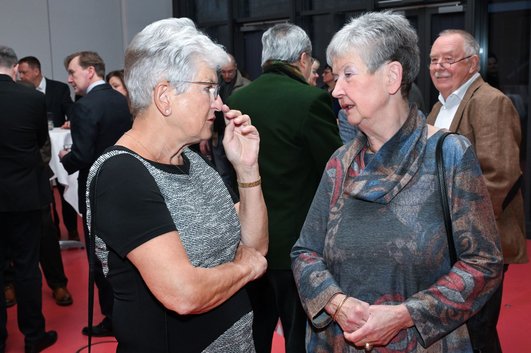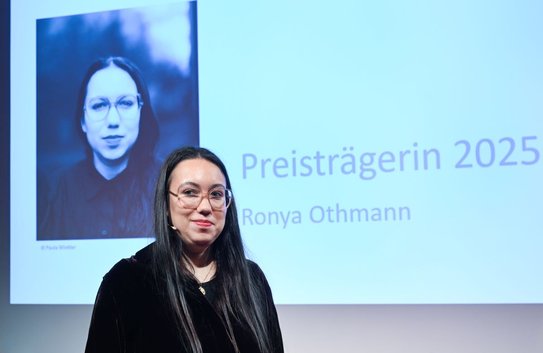Erich Loest Prize 2025 awarded to Ronya Othmann.
Leipzig, 24 February 2025This evening, on Erich Loest's 99th birthday, writer and journalist Ronya Othmann was awarded the 2025 Erich Loest Prize. Established in 2017 by Media Foundation of Sparkasse Leipzig in memory of Leipzig writer and honorary citizen Erich Loest, who died in 2013, the prize is endowed with 10,000 euros and is awarded every two years. The fifth award ceremony took place at the Foundation's headquarters at the Media Campus Villa Ida in Leipzig.
"The Erich Loest Prize commemorates a writer whose work is inextricably linked to our city: a keen chronicler, a tireless admonisher, and a true Leipzig citizen," explained Dr Harald Langenfeld, Chairman of the Board of Media Foundation and of Sparkasse Leipzig, in his welcoming speech. "With her writing, this year's award winner Ronya Othmann stands in a tradition that understands the literary perspective on current events as an act of remembrance and testimony - entirely in the spirit of Erich Loest," Langenfeld continued.
The prize was awarded to Othmann in particular for her novel Vierundsiebzig (Seventy-Four), published in 2024, in which she deals with the attempted genocide of the Yazidis by the terrorist organization Islamic State in 2014. In her laudatory speech, Dr Julia Encke, arts section editor of the Frankfurter Allgemeine Sonntagszeitung, this year's Loest Prize winner: "The cover of 'Vierundsiebzig' says novel. […] Othmann approaches the almost unbearable reality of the genocide without fictionalization. She visits the sites of the massacres, the refugee camps, the memorials. She spares us nothing. […] Thus, she becomes a documentarian. By blending reportage, interview transcripts, and travelogues with essayistic, historical, and autobiographical inserts, she also places context in context. Above all, however, she introduces a meta-level, a speaking and writing about what she sees and observes. It is this level that makes her work great literature."
Preisträgerin Ronya Othmann dankte Stiftung und Jury für die Zuerkennung des Erich-Loest-Preises: "Ebenso wie Reaktionen von Leserinnen und Lesern sind es Würdigungen wie dieser Preis, die mir verdeutlichen, dass meine Worte, die Geschichten, die ich weitererzähle, nicht ungehört verhallen. Das gibt Ansporn, auch weiterhin genau hinzuhören, genau hinzusehen und aufzuschreiben, was ich höre und erlebe." (Dankesrede von Ronya Othmann zur Erich-Loest-Preisverleihung 2025).
The jury, chaired by Andreas Platthaus, head of the literature and literary life section of the Frankfurter Allgemeine Zeitung, justified the jury's choice of Ronya Othmann in late summer last year by stating that with her novel she had created a "great literary monument to the genocide of the ethnic-religious minority of the Yazidis in Kurdish Iraq (2014), which is at the same time a very personal search for origins and cultural identity, which in turn touches on central questions of our present."
"With Ronya Othmann, our award jury has selected a young literary voice who, drawing on her own biography, casts global political events into literary form, thus writing against the forgetting of a genocide," said Stephan Seeger, Managing Director of Media Foundation and Director Foundations of Sparkasse Leipzig, upon the jury's vote. "I thank the jury for their outstanding choice and warmly congratulate Ronya Othmann: She is a worthy member of our award-winning ranks."
About the Jury:
- Andreas Platthaus (head of the jury; head of the literature and literary life section of the Frankfurter Allgemeine Zeitung)
- Linde Rotta (freelance autor)
- Ines Geipel (autor and Professor of Poetry at the "Ernst Busch" Academy of Dramatic Arts in Berlin; Erich Loest Prize winner 2023)
- Dr Katrin Schumacher (editor-in-chief of Literature, Film, Stage at MDR Kultur radio)
- Prof. Dr. Jobst Welge (Professor of Romance Literature at the University of Leipzig)
About the laureate:
Ronya Othmann, born in Munich in 1993, grew up in the Freising district as the daughter of a Kurdish-Yazidi father and a German mother. Othmann's childhood and youth were shaped by travels to visit her father's family in a Yazidi village in northern Syria, which later ceased to exist. After graduating from high school in 2012, Othmann began training at the International Munich Art Lab and the Swiss Literature Institute of the Biel University of the Arts. From 2014, she studied at the German Literature Institute in Leipzig, where she organized the 2015 Kurdish Film Festival.
Othmann primarily writes prose, poetry, and essays. Her literary works explore topics such as migration, home, and war, among others. Her debut novel, Die Sommer (The Summers),was published by Hanser Verlag in 2020. It uses a family history to reflect on the civil war in Syria and the murder of the Yazidis by the Islamic State. In her first volume of poetry, die verbrechen(the crimes), (2021), Othmann refers to a "tired, tired land" that has been identified by reception as Kurdistan. She interweaves the historical and ideological traces of a century with the memories of a lyrical self. Her novel Vierundsiebzig (Seventy-Four) was published in 2024. Othmann has also published journalistic texts, including for ,Der Spiegel and taz. Since March 2021, she has written the column "Import Export" for the Frankfurter Allgemeine Sonntagszeitung. Since May 2021, Othmann has been one of eight authors responsible for the column "Leipziger Stimmen" for the Leipziger Volkszeitung.
About the Prize
The prize, endowed with 10,000 euros, is awarded every two years by Media Foundation of Sparkasse Leipzig in memory of the writer Erich Loest. Erich Loest maintained close ties to the Sparkasse's Foundations throughout his life: as a founding member of Media Foundation and as a patron of the Cultural and Environmental Foundation, to which he bequeathed his literary estate. The prize honours authors who not only describe the social and political conditions in Germany, but also help to shape democratic discourse with their voices. Furthermore, the award winners should have ties to the Central German region. Previous winners have been Guntram Vesper (2017), Hans Joachim Schädlich (2019), Ulrike Almut Sandig (2021), and Ines Geipel (2023).
